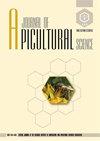非洲化蜜蜂入侵的时机恰逢美国犹他州一种稀有罂粟的专业传粉者在当地灭绝
IF 0.8
4区 农林科学
Q4 ENTOMOLOGY
引用次数: 3
摘要
摘要外来物种的引入会对入侵地区本地物种之间的互惠关系产生深远影响。然而,确定新的入侵者是否影响了本地物种取决于准确重建入侵时间。非洲化蜜蜂(AHB)在1994年至2011年间的某个时候抵达犹他州南部,最近与Perdita meconis的当地灭绝有关,Perdita meconis是一种濒危罂粟Arctomecon humilis的本土专业传粉者。尽管AHBs据称于2008年在犹他州南部首次被发现,但到1998-2001年,它们在附近的内华达州、亚利桑那州和新墨西哥州的存在表明,它们可能更早地出现在犹他州。我们通过使用分子标记来确定2000年至2008年间收集的博物馆标本的母系祖先,从而确定了AHBs在犹他州南部的到达日期。我们发现,从2000年起,AHB就出现在犹他州南部,这使入侵者的到来日期提前了至少8年。这证实了AHBs在犹他州meconis P.的局部灭绝中发挥了关键作用的假设。这项工作还强调了为博物馆藏品中的蜜蜂等常见物种提供担保以满足未来研究需求的重要性。本文章由计算机程序翻译,如有差异,请以英文原文为准。
Timing of Invasion by Africanized Bees Coincides with Local Extinction of a Specialized Pollinator of a Rare Poppy in Utah, USA
Abstract The introduction of exotic species can have profound impacts on mutualisms between native species in invaded areas. However, determining whether a new invader has impacted native species depends on accurately reconstructing the invasion timing. The arrival of Africanized honey bees (AHB) in southern Utah at some point between 1994 and 2011 has recently been implicated in the local extinction of Perdita meconis, a native specialist pollinator of an endangered poppy, Arctomecon humilis. Although AHBs were purportedly first detected in southern Utah in 2008, their presence in nearby Nevada, Arizona, and New Mexico by 1998–2001 suggests that they may have been present in Utah much earlier. We refined the arrival date of AHBs in southern Utah by using a molecular marker to determine maternal ancestry of museum specimens collected between 2000 and 2008. We found that AHBs were present in southern Utah from 2000 onwards, advancing the arrival date of this invader by at least 8 years. This lends credence to the hypothesis that AHBs played a critical role in the local extinction of P. meconis in Utah. This work also highlights the importance of vouchering even common species such as honey bees in museum collections to serve future research needs.
求助全文
通过发布文献求助,成功后即可免费获取论文全文。
去求助
来源期刊

Journal of Apicultural Science
ENTOMOLOGY-
CiteScore
1.70
自引率
0.00%
发文量
9
审稿时长
>12 weeks
期刊介绍:
The Journal of Apicultural Science is a scientific, English-language journal that publishes both original research articles and review papers covering all aspects of the life of bees (superfamily Apoidea) and broadly defined apiculture. The main subject areas include:
-bee biology-
bee genetics-
bee breeding-
pathology and toxicology-
pollination and bee botany-
bee products-
management, technologies, and economy-
solitary bees and bumblebees
 求助内容:
求助内容: 应助结果提醒方式:
应助结果提醒方式:


